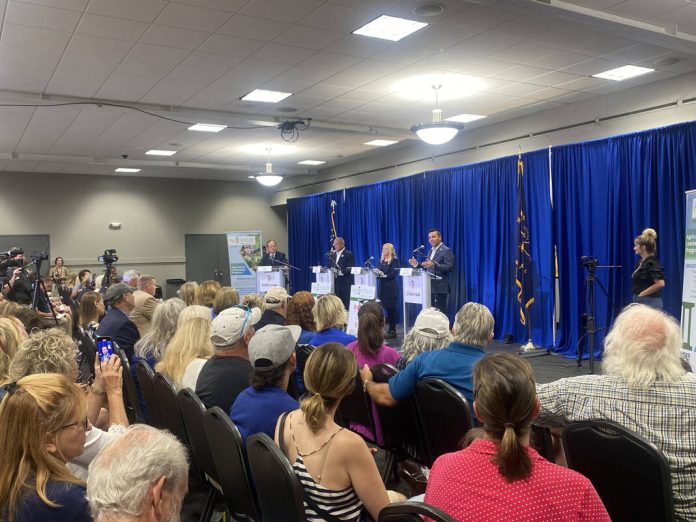The Indiana lieutenant governor’s primary role is serving as the state’s secretary of agriculture and rural development, so it was fitting that the first and likely only lieutenant governor debate of this campaign season was agriculture-focused.
Republican Micah Beckwith, Democrat Terry Goodin and Libertarian Tonya Hudson spent most of Tuesday’s debate at the Indiana State Fairgrounds detailing how they would lead the state’s farm-related agencies and arguing about why their tax policies would be most beneficial.
Appropriately, the debate was moderated by an AgrIInstitute panel in the Purdue Extension Building before a standing-room-only crowd.
On property taxes
Beckwith, who is the running mate of GOP gubernatorial candidate Mike Braun, promised that farmers would see relief under Braun’s tax plan and said it would not raise taxes to fund government growth that outpaced citizens’ desires.
In its current form, Braun’s tax proposal is focused on lowering the property tax burden for homeowners by increasing the homestead deduction, capping property tax increases for homeowners and increasing voter participation in property tax referendums.
However, its lack of particulars about how local governments would make up for the potential loss of property tax revenue under the plan has caused some to raise concerns that the tax burden would simply be shifted to other types of property owners, such as farmers.
Goodin, who is the running mate for Democratic gubernatorial candidate Jennifer McCormick, called Braun’s tax plan a “knee-jerk reaction” that would defund the police and schools if implemented.
While the Democratic ticket has not released its tax plan, Goodin said their administration would spur rural growth to help those communities control their property tax burden.
“It’s very simple,” Goodin said. “If you want to have good quality services, you have to pay for them.”
Hudson referred to Libertarian gubernatorial running mate Donald Rainwater’s tax plan that would cut property taxes for a residential property tax to 7% for the purchase price or 1% maximum for seven years.
Hoosiers are getting kicked out of homes “mafia-style,” she said, because property taxes are pricing people out of their homes.
Water rights
Local control over water rights also emerged as key issue, reflecting debate over the Indiana Economic Development Corp.’s exploration of building a 35-mile water pipeline from the Lafayette area to serve the potential water needs of its LEAP Lebanon Innovation District in Boone County.
Beckwith said the LEAP project has “run off the rails” and is an example of IEDC picking “winners and losers.”
Indiana has the resources for development, he said, but it needs to guide development to the right projects and places. There would be a focus on channeling development in more small towns under Braun, he said.
Ensuring farmland is not sold to foreign corporations, specifically those based in China, is another priority, Beckwith said. He wants to build off a law passed last year that prohibits adversarial countries from owning or leasing Hoosier farmland.
Beckwith criticized the IEDC, calling it “a shadow government” lacking transparency. He said its current strategy is incentivizing bad behavior from major, sometimes foreign, corporations using tax abatements.
Goodin said the state needs to strike a balance between economic development and agriculture when it comes to water usage. He called water one of the state’s “most precious commodities,” comparing it to fights over oil.
He said a clear water policy is needed moving forward, so people aren’t adversely affected.
“We need to put together policy for all those folks who are impacted by the use of water and make sure that we put the right process together,” he said.
He also said this policy needs to ensure water quality and clean environment concerns are also addressed.
“It’s a shame that Midwestern states shipped hazardous material to the state of Indiana after a train wreck in northern Ohio,” Goodin said. “We’ve got to put together a plan for Indiana to remain sustainable.”
Hudson said she’d work with the Legislature to create a “fair and balanced” water policy that would ensure clean water.
Goodin capitalized on his background
Goodin worked to connect with the audience by emphasizing his farm family history and his record of sponsoring rural-focused legislation while he was a state lawmaker.
A native of Austin, Indiana, Goodin grew up on a cattle farm and still tends to his family farm today.
That background allowed him to take advantage when Beckwith misspoke and said farmers could not turn down $1,500-per-acre offers from foreign corporations. According to a Purdue study, the average price of farmland ranged from $9,000 to $14,000 per acre.
“I want to find some of that $1,500-acre farmland,” Goodin said as the crowd let out a laugh. “I’ll buy all of it.”
But Beckwith, Noblesville campus pastor at Life Church, garnered head nods as he quoted scripture and said he and Braun were the “family values” ticket.
As a real estate broker, Hudson says she understands the need for tax reform.
The election is Nov. 5.
By Cate Charron, Indianapolis Business Journal





